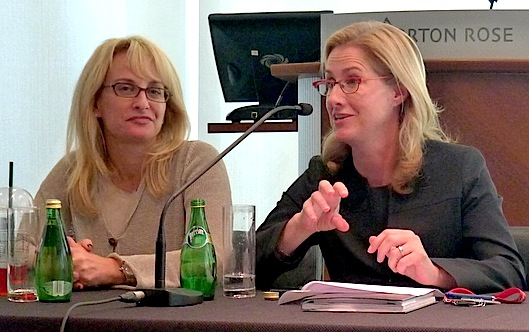 A commercial litigator and an IP lawyer, both in grey suits and black pumps, traded notes on how their first two weeks on the job were going as they rode the elevator up to Norton Rose OR LLP’s offices for a Young Women in Law panel discussion last week. (The event was co-sponsored by the Marsden Group.)
A commercial litigator and an IP lawyer, both in grey suits and black pumps, traded notes on how their first two weeks on the job were going as they rode the elevator up to Norton Rose OR LLP’s offices for a Young Women in Law panel discussion last week. (The event was co-sponsored by the Marsden Group.)
They joined a room full of other young female lawyers to hear a panel of lawyers-turned-human-resource directors at Bay Street firms give advice on how to “navigate your way through private practice.”
Women make up over 50 percent of law school grads, but they are two and a half times as likely to leave private practice as men, so retaining top female talent on Bay Street is an issue.
The big tip for staying on Bay? “Resilience.” “You’ve got to look at your career in the long term,” said Michelle Gage, national director of legal talent, at Norton Rose, “you could come to see that hellish closing as a major learning experience.”
Another big tip: females have got to be doing it for themselves. “Being a good girl does not equate to success in this profession,” said Deborah Glatter, director of professional development and student programs at Cassels Brock & Blackwell LLP. “Helping partners all the time to look good in their careers is OK, but you also have to take time to develop your own brand.”
Panelists had lots of advice on how to do just that, including:
- Say “no” to the senior partner sometimes: Do 1,900 hours instead of 2,000 and use the rest of the time to develop your brand, write articles, solicit speaking engagements and develop new business
- Think long-term: Build a client list for the future by keeping in touch with the people you know from university and law school, take them out for lunch and catch a rising star who could become a top client one day
- Work the inside angle: be the person everybody wants to work with
- Never introduce yourself as a lawyer: tell people what type of law you practice and what it is that you do; this can open doors
- Befriend men: Male colleagues pass opportunities onto one another through informal networks, if you’re only hanging with the ladies, you’re missing out
Panelists didn’t shy away from acknowledging the realities of working tremendously long hours, especially with other “emotional pulls” like children and elder care.
There was no easy answer on achieving the elusive work-life balance. When moderator Carolyn Berger of The Marsden Group (a panel sponsor) posed the issue to Joanne Clarfield Schaefer (pictured above at left), national director of professional development and student programs at Bennett Jones LLP, she joked that it was the hardest question to answer. But she didn’t beat around the bush with her advice. “If you take some time off to have children you better have some goodwill in the bank,” she said. “The news on work-life balance is so-so, we are in a service business in a downturn, if you don’t step up, somebody else might.”
Mary Jackson, chief officer, professional resources at Blake, Cassels & Graydon LLP (pictured above at right), weighed in on how to make life easier at work, “You have to look at your outside relationships, are they helpful or are they taking away? Friendships and relationships can help you or hurt you. If your partner understands the demand on your time, it can increase your happiness.”
After the lively lunchtime panel, the floor was opened for questions, but the audience didn’t have any. Sensing perhaps that the young lawyers were overwhelmed by the array of blunt advice on how to tough it out on Bay Street, Mary Jackson left them with one final tip: Do one thing at a time: “Just pick one thing that’s easy to do: work out, or establish a better relationship with someone in the office.”
Change, it seems, happens slowly on Bay Street.

